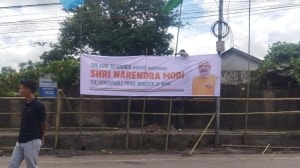Through their eyes and ears
The need for a Multimedia Indian International news network is now more urgent than ever before. There was always a considerable imbalance i...

The need for a Multimedia Indian International news network is now more urgent than ever before. There was always a considerable imbalance in the international information order. But the sources of news and information in the hands of western monopolies today are becoming instruments of manipulation. Partisan agendas are transforming news into propaganda.
And the warnings are coming not from among our tribe in India, but from journalists in the West who are in the process of turning around public opinion in their own societies on such issues as Palestine and Iraq.
BBC’s Middle East correspondent for 10 years, Tim Llewellyn, has taken his former employers to task in an article in the Guardian. “Since the Palestinians began their armed uprising against Israel’s military occupation three years and eight months ago, British television and radio reporting of it has been, in the main, dishonest — in concept, approach and execution,” he writes. “The broadcasters’ language favours the occupying soldiers over the occupied Arabs, depicting the latter, essentially, as alien tribes threatening the survival of Israel, rather than vice versa. The struggle between Israel and the Palestinians is shown, most especially on mainstream bulletins, as a battle between two ‘forces’, possessed equally of right and wrong and responsibility… It is the tyranny of spurious equivalence.”
Llewellyn’s views are supported by the Glasgow University Media Group who have analysed BBC and ITN coverage between late 2000 and 2002.
The situation with Iraq is even more disturbing. The Anglo-American invasion is being amplified (or toned down) by the Anglo-American media. What room for impartiality here? And we in India are swallowing it all hook, line and sinker. Iraq happens to be a country where Indians would have more access, all around, compared to journalists from any other part of the world.
The arrival of Arab channels like Al Jazeera and Al Arabia has been of no use to us because they are in Arabic. There are reports that Al Jazeera is about to launch an English channel soon. It will, of course, be a pity that the world’s largest and most vibrant democracy will supplement its diet of information from the Arab world through channels sponsored by sheikhdoms known neither for democracy nor a free press. I make this point without intending to belittle Al Jazeera and Al Arabia’s independent achievements.
In an age of globalisation one can’t quarrel with the Anglo-American media’s quest for global reach. But the search no longer is just for global reach. It has somehow got enmeshed with the neocons’ agenda for global dominance.
The first global event after the Soviet collapse was the Gulf War. For the first time in history, a war was brought directly into our drawing rooms by CNN. The war ended in March 1991. In April, BBC World Service TV was launched. It is a small footnote to the history of those days that the Hindujas were invited by the BBC to be their “strategic partners” in India. What happened to that deal?
The coming into being of CNN and BBC as 24-hour world affairs channels was not for altruistic reasons. A major purpose was to push globalisation in a direction. But a gigantic machine, created for one agenda, found itself being utilised for a purpose it was never intended for.
The dust had barely settled on Desert Storm, when Yugoslavia broke up and for five years the world helplessly watched the brutalisation of Bosnian Muslims, day after day — on BBC and CNN. Networks had become vehicles for a macabre show which radicalised the Muslim world more than anything else in recent history. The rise of Turkey’s Islamist Refah Party was a direct consequence. The second Intifada, Afghanistan, Iraq have progressively fuelled Muslim anger and swelled the ranks of global terrorism.
Divisions over Iraq have aggravated European anxieties on Anglo-American media domination. Germans have started a pilot project on international affairs. President Chirac has initiated the idea of a “French CNN”. Japan, China are anxious at the dominance of one point of view in the global media.
There is only one country which qualifies to step in as a moderating partner in the concert of democracies. We have a thriving democracy, a vigorous, independent media, a lively, upwardly mobile diaspora and a middle class with command on the English language.
It is a shame that we do not have bureaus in SAARC countries, Afghanistan, Middle East, Iraq, Southeast Asia, Africa, the US, UK and Europe. The costs are exaggerated because our networks have never done a study. But will viewers be interested? Ask Doordarshan. They sent reporters to Baghdad, Kabul, Ankara, Jerusalem, Amman, Cairo to cover the Iraq war. The ratings touched the popularity of Kaun Banega Crorepati. An international news channel highlighting the Indian perspective will not only serve a national purpose but also be a commercial success.
Photos





- 01
- 02
- 03
- 04
- 05


























